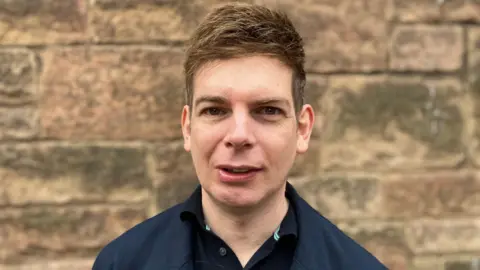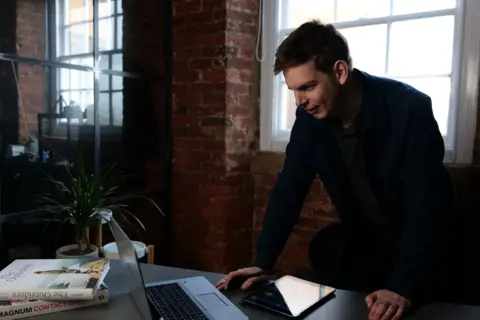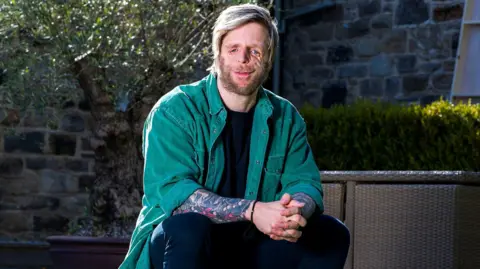'I once cried every day but now I love my face'
 BBC
BBC"I spent a good five years crying in that mirror... I cried every day looking back at myself, traumatised."
Aged 18, Gary Parsons had the world at his feet. But when he woke up one morning to find half of his face did not move, he felt his world fall apart.
He spent years coming to terms with a condition called Bell's palsy, which he has never fully recovered from.
After a lengthy tussle with his own self-esteem and confidence, Gary is set to appear on Channel 4 show Love My Face - offering treatment and support for people with facial differences.
Gary, who opted to have smile surgery - an operation designed to restore symmetry or create a smile movement - while on the show, said: "I've learned to love myself now and I realised that we smile from the inside."
The 41-year-old, from Belper in Derbyshire, said he was a confident young man with an "entrepreneurial spirit", building computers and selling them to his teachers.
He was attending college and was looking forward to what his life had in store for him.
But that changed one morning when he woke up to paralysis on one side of his face. He initially thought it would return to normal after a few minutes, but panic started to set in when it didn't.

What is Bell's palsy?
Bell's palsy is temporary weakness or lack of movement that usually affects one side of the face.
Treatment with steroids can help and most people get better within six months.
Symptoms also include:
- Drooping eyelid or corner of your mouth
- Drooling
- A dry mouth
- Loss of taste
- A dry or watering eye
People are urged to call 999 if:
- They cannot lift up both arms and keep them there
- They have difficulty speaking such as speech being be slurred or garbled
Either could be the sign of a stroke.
Source: NHS

According to experts, 71% of people with Bell's palsy fully recover within three to six months, but Gary never did.
"For 24 years, I've had to deal with my face not fully working," Gary said.
"I was at the age where I was spreading my wings, getting the bus to college, halfway through a business course and I genuinely thought my dreams and my life were over.
"I thought I wouldn't do what I've been able to do... I didn't leave the house unless it was for medical appointments for months on end."
 Supplied
SuppliedHe added his medical appointments only focused on his physical changes with no real support for how it affected him mentally.
Gary was encouraged to return to work at his job at Dixons by his mother, whom he describes as his "rock", but opted to work in the warehouse as he "couldn't be in front of people".
He also recalled a story when he was on a night out and someone asked a friend of his what was wrong with his face.
"That comment put me back 10 years... that comment, intentional or not, really impacted me," he said. "Not smiling was my way of wearing a mask, my armour."
'I hated myself'
Gary said the journey to accept his facial features had taken years.
"I've worked on myself a lot, on my confidence and self-esteem in that time," he said.
"For 20 years, I stopped looking in the mirror, I stopped smiling, which is really sad because If I did, people would look at me a bit confused.
"I spent a good five years crying in the mirror... from the age of 18 to 23, I cried every day looking back at myself traumatised, trying to deal with the person on the other side of it.
"I wasn't in love with myself, I hated myself because my identity had changed overnight."
Gary met a woman online - who had a rare skin condition she developed when she was 18 - on an app called Clubhouse.
The app is an audio programme known for its focus on live, intimate discussions similar to a podcast.
"I said to myself, enough is enough now... I need to talk about this openly," he said.
 Flabbergast/Channel 4
Flabbergast/Channel 4Gary went on to tell his story and posted a video online - and says the response he received was overwhelming.
"At 8am the next morning, I was in bed in tears because of all the love, the amazing comments that I had from friends and family and I decided to stop being silent and use my voice for good," he said.
Then a production company and Channel 4 saw his story and invited him on the show, which he described as an "amazing experience".
"I genuinely didn't think they would pick me, I didn't think I was worthy enough because I felt Love My Face was about somebody who had gone through so much more," he said.
"I love my face now... I've learned to love myself now and I realised that we smile from the inside."
Follow BBC Derby on Facebook, on X, or on Instagram. Send your story ideas to [email protected] or via WhatsApp on 0808 100 2210.
